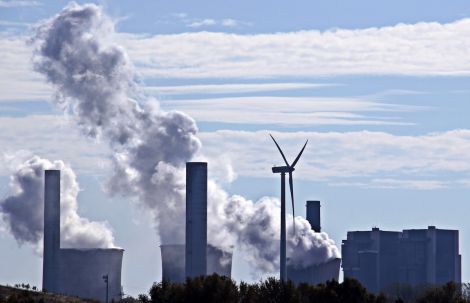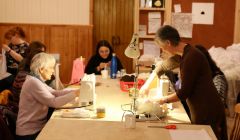Climate / What folk are doing to beat the big New Year climate change challenge – Part 2
BRINGING the Katowice climate deal agreement to life will be a daunting challenge for communities around the world.
After all, to keep global warming as close to just 1.5 degrees as possible, carbon and all the other greenhouse gases such as methane need to be removed from the atmosphere on a truly gigantic scale.
By 2050, that’s in just 31 years, scientists recommend the world should have reached ‘net zero’ CO2 emissions, a target that will have consequences for Shetland’s energy industry at Sullom Voe Terminal and Shetland Gas Plant.
In this two-part feature Shetland News asks local people (or those with a strong link to the local community) what they are doing in their personal and professional lives to try to counter these potentially catastrophic changes
Part 1 can be read here.
Please feel free to add your comments at the bottom of this page and let us know what you are planning to do for the planet in 2019.
DAVE WINK
Shetland Gas Plant boss Dave Wink says Total and some other fossil fuel energy companies are turning to “low carbon” gas production. SGP is also going to do its bit for the planet by reducing carbon footprint by up to one-twentieth next year.
“Over the last few years companies like Total have pivoted toward gas production, which is a lower-carbon fuel. As a result the UK has been able to successfully move away from using coal for generating electricity. The more efficient we are at the Shetland Gas Plant, the more the UK can rely on our gas rather than coal.
“We also aim to reduce our impact on the local environment here in Shetland. As part of our annual Environmental Improvement Plan, we are undertaking measures which will meet the requirements of the International Standard for Energy Efficiency (ISO 50001).
Become a member of Shetland News
“This will reduce our overall carbon footprint by up to 5 per cent in 2019. We will achieve this through reductions in routine flaring of hydrocarbons, improved use of fuel gas and by reducing the amount of power we use to treat gas at the plant.”
JONATHAN HINKLES
Another who can lay claim to being in charge of an organisation that produces a fair bit of greenhouse gas is Loganair boss Jonathan Hinkles. Again, Loganair is taking steps to mitigate its carbon footprint and plastic usage. Domestically, the Hinkles are “early converts” to energy consciousness.
“At work, we’ve done a lot over the last year to improve our environmental performance. Our on-board recycling and use of recycled and bio-degradable materials is working really well. One of our major initiatives for 2019 is to begin phasing out diesel-fuelled power units which provide electrical power to our aircraft on the ground, replacing these with rechargeable battery units over the next two years, and this will cut out a significant source of emissions.
“At home – we’ve been actively recycling for years and were early converts to a domestic energy monitor, so I’d hope we do pretty well on that front. The main thing is to avoid single use plastics and make sure we buy from shops and businesses who are doing everything they can to move away from it – whether that’s the weekly shop or plants for the garden, which is a big hobby.
“On a business trip to the USA last month, I was horrified at just how far behind they are; there was no recognition of the environmental impact of plastics, even right by the coast. None. Everything came in a plastic container with no recycling bins or waste segregation visible anywhere. It highlighted just how much progress we’ve made in the UK, but we’ll still keep trying always to do more.”
IONA NICOL
First year journalism student at Edinburgh Napier University, Iona Nicol, from Trondra, vows to consume less and recycle more.
“In the New Year, I plan on reducing the number of needless items (clothing, makeup etc.) I buy and educating myself on where and how these products are produced before I make a purchase.
“This goes hand in hand with cutting down on my consumption of single-use plastics and unrecyclable food packaging. I plan to do this by beginning to reduce the number of pre-packaged fruits and vegetables I buy, when possible.
“I have always strived to be as environmentally conscious as possible and moving to Edinburgh has pushed this narrative in my life. I no longer own a car or drive daily, only doing so when I return to Shetland, instead opting to walk to university and around the city every day.
“I have a mini food waste compost bin in my flat and colour coded recycling bins which are used daily- these are habits that I intend to continue with in2019.”
MAT ROBERTS
Shetland Amenity Trust chief executive Mat Roberts has looking after the environment and reducing the organisation’s carbon footprint written into his job description.
“This has been my first almost full year in Shetland and despite many of my friends and family saying how far away I now live a few things feel much closer than ever. Climate change and Brexit have never felt that far away, in most cases much closer than the mainland.
“Shetland Amenity Trust has had an exciting 2018 and is looking forward an equally exciting year in 2019. We have been making our own contribution to reducing carbon through our work on peatland restoration, work I hope we can continue in the future. The Da Voar Redd Up is as popular as ever, with even more people collecting even more plastic from our beaches and road verges.
“If I have one wish for 2019, and that is that we see a real change in our attitude to plastic. The power of the consumer is greater today than ever. Every one of us can make a real impact with the choices we make at home, at work, in every aspect of our life. It’s been great to see recycling introduced to all homes in Shetland and I hope to see it offered to every business in 2019.
“One of the great things about working in Shetland is that many locations have access to superfast broadband, and this has enabled the Amenity Trust to install video conferencing facilities in our Lerwick offices. This has saved money, time and reduced our carbon footprint.
“In 2019 we will set benchmarks to further reduce our own carbon footprint and the amount of waste we produce.”
RYAN THOMSON
North Isles councillor Ryan Thomson has campaigned on single use plastics and litter and is in one of the most environmentally influential positions in the council as chairman of the SIC environment and transport committee. He is pledging to make carbon savings for the local authority and for himself.
“The council continues to make progress in becoming an environmentally sustainable council and leading the way within Shetland to be a low carbon society.
“I will make sure we continue to work together in our delivery of carbon savings across our departments in a bid to reduce our carbon emissions as per our Carbon Management Plan.
“Personally, I will continue to limit and reduce the number of items containing single-use plastics and I will continue to buy local whenever possible, cutting out food miles.
“I plan on using public transport far more often, we have a bus stop at the end of the Wadbister road and a very regular bus service using the number 21 and 23 services.
“I’d also like to invest in a bicycle at some point in the year in the summer months, only using the vehicle when required.”
Become a member of Shetland News
Shetland News is asking its readers to consider paying for membership to get additional perks:
- Removal of third-party ads;
- Bookmark posts to read later;
- Exclusive curated weekly newsletter;
- Hide membership messages;
- Comments open for discussion.
If you appreciate what we do and feel strongly about impartial local journalism, then please become a member of Shetland News by either making a single payment, or setting up a monthly, quarterly or yearly subscription.














































































